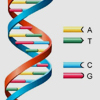It came from God, of course, as everything does. That is our theological understanding. But we still don't understand it scientifically because the Standard Model of particle physics breaks down at the Planck scale, where quantum effects of gravity become significant. Until someone develops a complete theory of quantum gravity that can describe the physics at such high energies and densities as existed in the early universe—that is, prior to the inflationary period—our theological understanding is all we have for now. A scientific understanding will have to wait.
I am beginning to suspect that you're not arguing in good faith. It's possible (but unlikely) that you genuinely don't know what theoretical means in the context of physics, but someone engaging in this kind of discussion should, at a minimum, know that it doesn't mean speculative. I will charitably assume for now that you're just uninformed and explain to you that
"theoretical" in physics refers to mathematical systems for describing reality, which are tested against experimental observations and empirical data (e.g., discovering the Higgs boson with the Large Hadron Collidor).
NOTE: A person is arguing in bad faith if he's not being honest or sincere in his arguments or has ulterior motives or hidden agendas. He may use fallacies, distortions, misrepresentations, or personal attacks to undermine his opponent's position or credibility. He may also refuse to acknowledge valid points, evidence, or counter-arguments, or change the subject when challenged. He may not be interested in finding the truth or reaching a mutual understanding, but rather in winning the argument or advancing his own interests. A Christian should never be guilty of this but, unfortunately, it happens.
I am dumbstruck that you need to be told this but the term "kind" is not something that proponents of evolution need to define—because it's not a term they use. It is a creationist term, also known as baramin (created kind) and still, despite 60 years of prolific creationist publications, no clear and consistent definition has ever been provided. I can't explain how one kind of animal evolved into another kind of animal
because I have no idea what kind even means.
I wasn't disputing or questioning its legitimacy. I said it's like asking how felines evolved into cats. Just as cats ARE felines, so humans ARE hominids (apes).
Yes, there are many differences between humans and gorillas, including the obvious morphological differences. But humans did not evolve from gorillas, nor vice-versa, so I am missing whatever your point was. There is something like ten million years of evolution between humans and gorillas, so clear differences should be expected.
And, no, I've never seen a gorilla worship the living God. (In fact, I've never seen a gorilla, period.) But it would not surprise me if it does, in its own way unrecognizable to us: "Let everything that has breath praise the LORD" (Ps 150:6; cf. Rev 5:13).
Humans did not evolve from orangutans, gorillas, chimpanzees, or bonobos, much less rhesus monkeys (which are Old World monkeys). There are 30 million years of evolution between humans and rhesus macaques, 14 million years of evolution between humans and orangutans, 10 million years between humans and gorillas, and 7 million years between humans and chimpanzees (and bonobos).
Think of it like this: You have population X that split into two populations, A and B. At this point, they are the same species but two different populations. Fast-forward 10 million years through some speciation and extinction events and now A and B are no longer the same species—but at no point of that history did A evolve from B, nor did B evolve from A. Go back 10 million years and you'll see they were the same species and in the same population X (which was neither A or B).
If some wolves (
Canis lupus) could evolve into dogs (
Canis familiaris), it's not difficult to suppose that some dogs could evolve into a species that is not-dog.
This is another reason why I'm beginning to suspect that you're not arguing in good faith, because you're asking questions that defy my response. I said very clearly that, "by converting hydrogen into helium through nuclear fusion, the Sun
increases its entropy." That is why I called the Sun "a source of
high-entropy radiation." That point was fundamental to the argument I was making about decreased entropy in this part of the system coinciding with significantly increased entropy in that part of the system, whereby the entropy of the system overall relentlessly increases.


